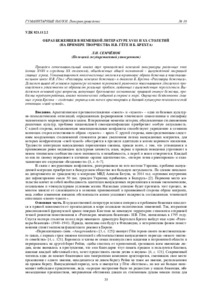Please use this identifier to cite or link to this item:
https://elib.psu.by/handle/123456789/14189Full metadata record
| DC Field | Value | Language |
|---|---|---|
| dc.contributor.author | Семчёнок, Л. И. | - |
| dc.date.accessioned | 2015-10-14T06:00:04Z | - |
| dc.date.available | 2015-10-14T06:00:04Z | - |
| dc.date.issued | 2015 | - |
| dc.identifier.citation | Вестник Полоцкого государственного университета. Серия A, Гуманитарные науки. - 2015. - № 10. – C. 35-39. | ru_RU |
| dc.identifier.issn | 2070-1608 | - |
| dc.identifier.uri | https://elib.psu.by/handle/123456789/14189 | - |
| dc.description | The Image of Refugees in the German Literature of XVIII and XX Centuries (Based on Literaryworks By J.W. Goethe and B. Brecht). L. Siamchonak (Polotsk State University) | ru_RU |
| dc.description.abstract | Проведен сопоставительный анализ двух произведений немецкой литературы различных эпох (конца XVIII и середины XX столетия), объединенных общей тематикой – вынужденной миграцией главных героев. Устанавливаются многочисленные отличия в трактовке образа беженца в повествовательном цикле И.В. Гёте «Разговоры немецких беженцев» и диалогах Б. Брехта «Разговоры беженцев». Делается вывод об условном характере изгнания персонажей рамочного повествования гётевского произведения и удаленности их образов от реальных проблем, связанных с вынужденным переселением. Вы- деляется основной круг вопросов, волнующих брехтовских изгнанников: правовой статус беженца, проблемы трудоустройства, анализ политических событий в стране и мире. Ощущение бездомности главных героев Брехта – следствие утраты ими точек ориентировки в базовой культурно-психологической оппозиции «свой-чужой».= Two literary works belonging to different epochs (end of XVIIIth and middle of XXth centuries) are compared in the article. Nevertheless, they have a common topic, namely, forced migration of the protagonists. The article ascertains multiple differences of the interpretation of a refugee’s image in the “Talks of German Refugees”, – a narrative cycle by J.W. Goethe, and “Refugees’ talks” by B. Brecht. The exile of the characters of the framework narrative was of inside-the-country kind, and their representation was outlying the realm of actual problems inherent to forced migration. The major scope of issues causing inconvenience among the refugee characters by Brecht is singled out, among them: the refugee’s legal status, challenge of unemployment, country and world political events analysis. The feeling of homelessness of Brecht’s protagonists is due to the loss of reference points inside the basic psychocultural opposition of “friend and foe”. | ru_RU |
| dc.language.iso | ru | ru_RU |
| dc.publisher | Полоцкий государственный университет | ru_RU |
| dc.relation.ispartof | Веснік Полацкага дзяржаўнага ўніверсітэта. Серыя А, Гуманітарныя навук | be_BE |
| dc.relation.ispartof | Herald of Polotsk State University Series A, Humanity sciences | en_EN |
| dc.relation.ispartof | Вестник Полоцкого государственного университета. Серия A, Гуманитарные науки | ru_RU |
| dc.relation.ispartofseries | Серия A, Гуманитарные науки;2015. - № 10 | - |
| dc.rights | open access | ru_RU |
| dc.subject | Государственный рубрикатор НТИ - ВИНИТИ::ОБЩЕСТВЕННЫЕ НАУКИ::Литература. Литературоведение. Устное народное творчество | ru_RU |
| dc.subject | Немецкая литература | ru_RU |
| dc.subject | сопоставительный анализ | ru_RU |
| dc.subject | тематика вынужденной миграции | ru_RU |
| dc.subject | Гёте И.В. «Разговоры немецких беженцев» | ru_RU |
| dc.subject | Брехт Б. «Разговоры беженцев» | ru_RU |
| dc.title | Образ беженцев в немецкой литературе XVIII и XX столетий (на примере творчества И.В. Гёте и Б. Брехта) | ru_RU |
| dc.type | Article | ru_RU |
| dc.identifier.udc | 821.112.2 | - |
| Appears in Collections: | 2015, № 10 | |
Items in DSpace are protected by copyright, with all rights reserved, unless otherwise indicated.
